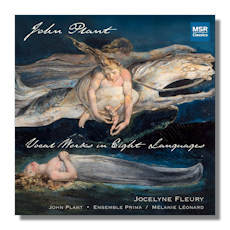
The Internet's Premier Classical Music Source
Related Links
- Plant Reviews
- Latest Reviews
- More Reviews
-
By Composer
-
Collections
DVD & Blu-ray
Books
Concert Reviews
Articles/Interviews
Software
Audio
Search Amazon
Recommended Links
Site News
 CD Review
CD Review
John Plant

Vocal Music in Eight Languages
- La notte bella
- Romance sonámbulo *
- Babel is a blessing - Eight Songs in Eight Languages
- In the world of zero *
Jocelyne Fleury, mezzo
John Plant, piano
* Ensemble Prima/Mélanie Léonard
MSR Classics MS1327 78:07
Summary for the Busy Executive: Startling, impressive.
Composer John Plant, born in New York, permanently fled the United States for Canada during the Viet Nam War, and more power to him. The American government threw away the lives of at least 50,000 soldiers as well as citizens' belief in their government with that shamefully frivolous war. To this day, the country hasn't recovered or reconciled its losses with the outcome. The professionals who warned that all Southeast Asia would fall like dominoes misread yet again that part of the world. Now Americans make bicycle journeys around Viet Nam and indulge in gastro-tourism.
At any rate, Plant studied not only music but also comparative literature. He knows several languages. Surmising an attraction to songs and other vocal forms doesn't stretch belief. The disc contains songs and vocal scenas. The surprise is how good these pieces are. The scena, the extended, dramatic vocal aria in particular puts up obstacles in a composer's way. It can easily degenerate into mere musical meandering, mainly because unlike more contained and explicit song-poetry, it forces a composer to invent a musical structure. Many writers go the "easy" route of responding in the moment. The results tend to natter. On the other hand, the usual composing strategies tend to make hash of the narrative flow of a poem. The composer has the task of shaping a coherent musical structure to that narrative. It seems that only the really great vocal composers bring it off: Brahms, Mahler, Wagner, Strauss, Stravinsky, Mussorgsky, Vaughan Williams, Debussy, Fauré, Britten, Barber, and so on. Plant succeeds in every item here.
First, Plant's literary taste is not only impeccable, but shows a fellow who reads widely and deeply. Babel is a blessing uses texts in Alexandrian Greek, Latin, Italian, French, Spanish, German, Russian, and English. Lorca and Catullus may be the most familiar names here, but I don't believe many know Machado, Bonnefoy, Saba, or Trakl. I thought one text not up to par. Still, it wasn't exactly Rod McKuen, either, and in any case, I'm a literary snob. Second, Plant speaks tonally, not that I necessarily dislike dodecaphonic songs, but I find fewer good ones, especially ones that don't sound like cats in heat. If I had to compare him to another composer, I'd say Barber, especially the Barber of the extended vocal works: Dover Beach, Knoxville, and Andromache's Farewell. There's that same integrity of vocal line and an essentially Romantic outlook without eschewing the grit of dissonance and the ambiguous key center. Three poems get settings ranging from ten to nearly twenty minutes. It takes real control to keep something that long together. My favorite setting was probably of Lorca's Romance sonámbulo. Plant takes advantage of textual repetitions to suggest ballad structure within something essentially organic form. The point is, however, that it does have form.
Most of the performers, including the composer himself at the piano, do really well. The songs sweep along. I did have problems with Jocelyne Fleury's voice. She's an intelligent, incredibly musical singer, who can instill you with the poems' emotions. However, her diction is a bit soft and her vowels can surprise you (I suspect she's probably a native Francophone). Furthermore, her voice is a bit frayed and there's a bit too much wobble. However, she reminded me of the incomparable Jennie Tourel – not a bad thing – and once I had made that association, the vocal faults didn't matter.
The recording in this Canadian production aims for a natural concert acoustic, although I find Fleury a bit too closely miked. Still, this disc should appeal to listeners on the lookout for distinguished songs.
Copyright © 2012, Steve Schwartz.



















